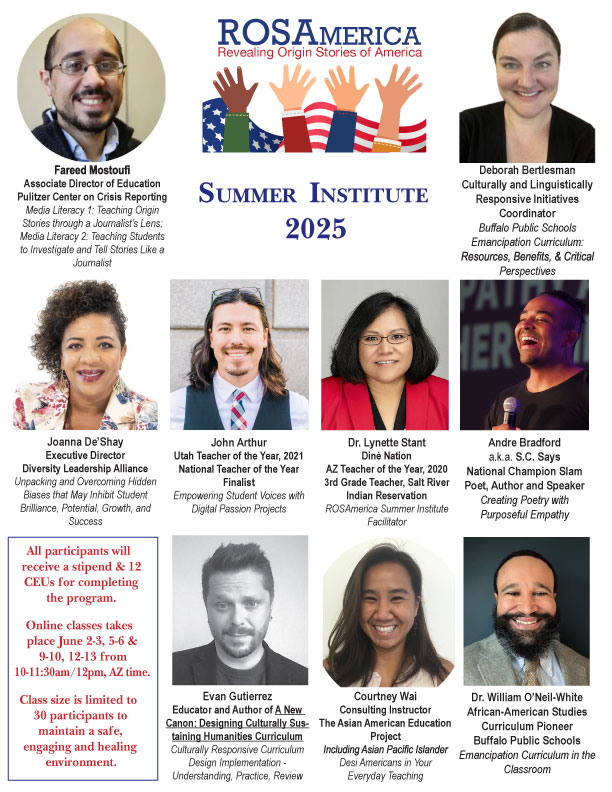2025 Summer Institute
Did you know that in Arizona over 66% of students who enrolled in K-12 schools in 2024 were students of color? Yet K-12 instruction often under-represents the voices, perspectives and contributions of people of color in curriculum. By contrast, academic studies show that in culturally responsive classes students develop a stronger sense of personal empowerment, perform better academically and graduate at higher rates.
Apply now for the 2025 ROSAmerica Summer Institute where AZ educators as well as pre-service teachers will probe deeply into what it means to be a culturally inclusive teacher, curriculum developer, student counselor, etc., from examining personal hidden biases to redesigning curriculum to reflect the natural “assets” that students of color already bring to the classroom, and much more.
The 2025 Summer Institute takes place over 8 days — June 2, 3, 5, 6, 9, 10, 12, 13, for 90 minutes per day, and is available to all K-12 Arizona educators and pre-service teachers around the state who apply and are admitted into the program.
During the 8 days, AZ educators engage in highly collaborative and interactive sessions, which include lectures, discussions, and opportunities to experiment with new tools and lesson plans.
Participants not only walk away with new tools, resources, new leadership skills and new understandings of the contributions that people of color add to the American tapestry, they also have a transformational experience about who they are as educators for their students of color.
Take 5 minutes or less to fill out the application.
ROSAmerica presenters for the Summer Institute 2025

Read what participants have to say about the Summer Institute……
“This session sparks a need to exercise awareness in my classroom. I will use the prompt question, ‘am I here to serve or save?’ I will continue to practice cultural humility, learn from my students’ lived experiences, and use them to inform my teaching and honor them.”
“I never knew how to use a culturally responsive curriculum with younger children. I think this gave me a good understanding of how and what to teach that is at their level so they can understand and appreciate other cultures and know their significance.”
“I am thankful for the perspectives brought forth in today’s session. My mind is spinning and I am questioning (in a good way) how to be a more culturally responsive teacher and how to become more knowledgable on the culture of my students and families!”
“I think it is important for students to understand their history. I think they should also know why their history and culture is important… I think it is good for parents to be aware of what students are learning while also teaching them what they want to learn. Some parents also are not comfortable with certain things being taught. So if they learn at home by giving students interview questions to ask, it’s not overstepping and a risk of making parents upset. It helps bring parent and community involvement into the classroom.”
“I will be using several of the lessons next year. I will also be sharing these resources with my team so we can be truly inclusive across our junior high team.”
“Storytelling is vital. Adding cultural diversity into research and classroom environments are key tools for learning and awareness.”
“This has been the most emotional day for me so far – it has helped me remember my why. Amplify student voices because [they] are most likely the ones to solve the world’s problems.”
